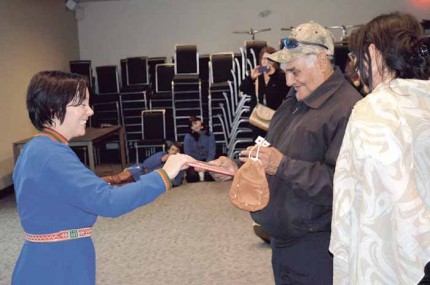For the Indigenous Sami peoples of northern Scandinavia, the lowly lichen is an essential element to their well-being. As the main winter food staple for the reindeer population of this region, the starchy fungus thrives in healthy forests. As go the lichen, so go the reindeer, the central protein in the Sami traditional diet.
That’s why, when a group of two dozen Swedish Sami youth visited Eeyou Istchee for a week in early October for cultural and political exchanges, they gasped at the extent of deforestation in the area around Waswanipi.
“We were shocked when we saw the clear-cutting,” said Anna-Marja Kaddik, a project leader for the Saamid Riikkasearvi, or National Union of Swedish Sami peoples, who organized the trip. “We immediately understood that the Cree people face many of the same issues we do.”
The Nation met with Kaddik October 9 after she and the Sami youth hosted a cultural exchange at the Capissisit Lodge in Oujé-Bougoumou the previous evening. Kaddik animated a slide show describing the traditional reindeer-herding lifestyle and challenges faced by the Sami in Sweden, where they enjoy few of the inherent rights that have been won in the courts over the years by the Cree.
She said the visit was triggered by an encounter with Cree Grand Council advisor Andy Baribeau at a human rights conference in Stockholm. She had been trying to arrange a cultural visit to another country’s Indigenous community, and Baribeau inspired her to choose Eeyou Istchee. He put Kaddik in touch with then-Youth Council Grand Chief Joshua Iserhoff, who supplied the necessary invitation for the group to visit Canada.
Kaddik is engaging with a quick intelligence and bright eyes. She speaks perfect English in addition to her native Sami language, and, of course, Swedish. But Kaddik is passionate about the lack of rights her people have to their traditional lands and culture in Sweden.
“They steal our land!” she said of the Swedish. “In fact, they steal our whole history – our language and our culture. This is an efficient way to erase a people.”
During her presentation at the Capissisit Lodge, Kaddik explained how mining and forestry industries are given free rein in Sami lands, with little or no compensation for the loss of reindeer habitat or environmental damage.
Meanwhile, Christian missionaries, with the help of the Swedish state, aggressively repressed Sami traditional beliefs during the 20th century.
“Sweden was very systematic in the way they colonized us,” Kaddik explained. “They didn’t just take our ground, they took our minds.”
 That’s one reason Kaddik works with the Foundation Protect Sápmi, which was founded by the Sami Reindeer Herders’ Association of Norway and by the National Union of the Swedish Sami People. Its purpose is to maintain and develop the Sami cultural community, and to help secure the interests, land rights, resource rights and development potential of Sami land-rights holders.
That’s one reason Kaddik works with the Foundation Protect Sápmi, which was founded by the Sami Reindeer Herders’ Association of Norway and by the National Union of the Swedish Sami People. Its purpose is to maintain and develop the Sami cultural community, and to help secure the interests, land rights, resource rights and development potential of Sami land-rights holders.
They work hard to breathe new life into traditional pursuits, including the colourful traditional dress of the Sami, different styles of which represent different regions of Sami territory throughout Scandinavia.
Another important cultural revival is taking place through the performance of the “joik” (pronounced “yoik”), a traditional Sami form of song. Several of the young visitors at the Capissisit Lodge performed joiks in evocative and sometimes haunting chants that charmed their Cree hosts.
The symbolism of the performance was important. With the Christianization of the Sami, joiking was condemned as sinful. In the 1950s, it was forbidden to use joiking in school in Sami areas, and one of the reasons that joiking may be controversial was its association with pre-Christian mythology rituals.
The performers sang of their history, their traditional ways and of their land. It’s an art that wistfully tells of the loss of so much history in the past century, said Kaddik.
“We have learned a lot from the Cree people about their struggle to win control over their territory,” she noted. “We don’t have those rights, but we are working to win them. However, we have to prove that we have occupied those lands over time in the courts. Without a written language, as the Cree have, that is very difficult.”
When asked about the progressive international reputation that Sweden has earned around the world, Kaddik responded, “That’s not for us! People should know what Sweden is doing to its own Indigenous people. That’s why we’re here!”


